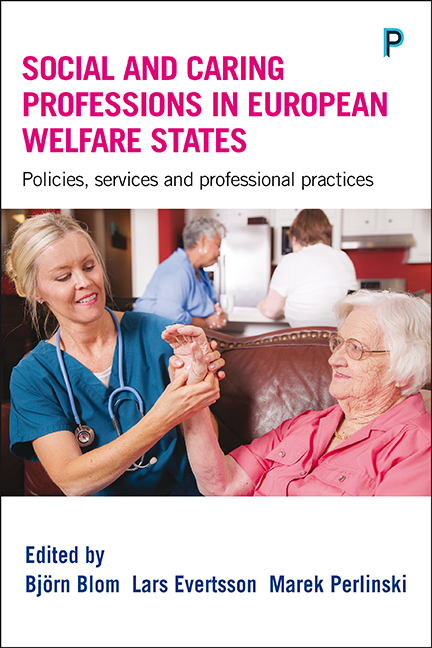 Social and Caring Professions in European Welfare States
Social and Caring Professions in European Welfare States Book contents
- Frontmatter
- Contents
- List of tables and figures
- Notes on contributors
- Preface
- one European social and caring professions in transition
- Part 1 Knowledge, reflection and identity in the social and caring welfare professions
- Part 2 Control, regulation and management
- Part 3 Collaboration, conflict and competition
- Part 4 Assessment, negotiation and decision making
- Index
two - The impact of education on professional identity
Published online by Cambridge University Press: 05 April 2022
- Frontmatter
- Contents
- List of tables and figures
- Notes on contributors
- Preface
- one European social and caring professions in transition
- Part 1 Knowledge, reflection and identity in the social and caring welfare professions
- Part 2 Control, regulation and management
- Part 3 Collaboration, conflict and competition
- Part 4 Assessment, negotiation and decision making
- Index
Summary
Introduction
The role of a professional social worker requires knowledge, skills, practical wisdom and certain norms and standards. Professional practice depends on the ability to combine these elements. Professional identity refers to social workers’ motivation for doing good work and their identification with the profession. The formation of professional identity is closely connected to socialisation and is a part of a dynamic process of professional development. The aim of this chapter is to examine the impact of social work education on professional identity.
In the literature on professional education, the concept ‘professional identity’ is frequently used, but in a variety of different meanings and contexts (Beijaard et al, 2004; Sims, 2011; Johnson et al, 2012; Wiles, 2012; Trede et al, 2013) and remains ‘fuzzy’ and ‘elusive’ and with ‘no explicit definition’ (Lamote and Engels, 2010, p 4; Sims, 2011, p 266). Professional identity refers to ‘… the principles, intentions, characteristics and experiences by which an individual defines him or herself in a professional role’ (McSweeney, 2012, p 367), as a lens through which to evaluate, learn and make sense of practice (Trede et al, 2013) or the ‘… perception of her/himself in the context of nursing practice’ (Steinbock-Hult, 1985). In some authors’ work, the perception is that identity as a professional primarily is developed in the community of practice to which one belongs and where knowledge from outside has a minor influence on professional identity (Wenger, 1998). In this approach, a strong professional identity will be shaped and reinforced by strong and stable communities and social processes generated within them (Henkel, in Reid et al, 2008).
Since the formation of professional identity is part of a process of socialisation, we intend to examine the impact of education, identifying mechanisms that may contribute to the development of professional identity. What can be learned from a literature review and what do we suggest might be important mechanisms? The focus is on social work education, but owing to a more extensive research literature, nursing and teacher education will also, to some extent, be included.
First, we introduce the literature on the formation of professional identity and the impact of professional education. Second, we develop the argument that the organisation of education and the interactions between students and teachers/supervisors are of crucial importance for the development of professional identity.
- Type
- Chapter
- Information
- Social and Caring Professions in European Welfare StatesPolicies, Services and Professional Practices, pp. 21 - 36Publisher: Bristol University PressPrint publication year: 2017
- 1
- Cited by
